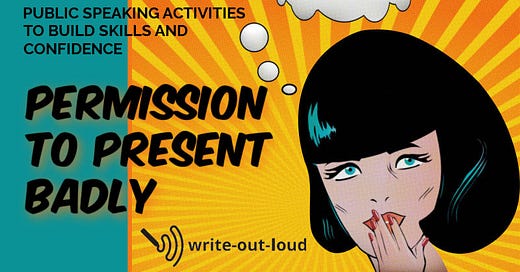Permission to present stunningly badly
A public speaking game building confidence and skills through exaggerating common presentation challenges
What do you think would happen if you gave people permission to speak very badly?
And let's make that suggestion even more confusing, and compelling. What about if, after every public speaking 'error' or presentation fault a person made, the audience clapped wildly?
‘Permission to Present Badly’ is a public speaking game I devised for my students.
The driver behind it was to counter their anxiety and to make it OK for them to present less than perfectly. The game acknowledges and exaggerates common public speaking faux pas, turning the 'failures' into ridiculously silly fun.
The rationale is that if we elevate our faults to a ludicrous level, in a safe way, it takes a lot of their sting away. Instead of being overwhelmingly humiliating, they become laughable, not so serious and most importantly, manageable.
Here's how ‘Permission to Present Badly’ works. As the leader of the activity there is some set-up to do.
Prepare a list of poor presentation habits.
For example:
mumbling, speaking too fast, too loudly, or too softly,
ending every sentence with a rising inflection,
excessive and unnatural pausing, repetition of filler words: ‘like’, ‘um’, ‘ah’,
repetition of phrases: ‘and then I...’, ‘there was this...’,
staring at the floor or out the window for the entire speech,
slouching with hands in pockets, monotone delivery,
rattling coins in pockets, fidgeting with notes,
use of specialized words only a few people understand (jargon), muddling notes,
props too small to see clearly, jokes that backfire, mispronunciation of names,
obviously scripted and over-exaggerated body language,
face pulling, wringing of hands, forgetting to breathe and, so on.
Gather speech texts of varying types including extracts from commonly known stories like Little Red Riding Hood. These the students are going to massacre! Choose things you don’t mind being mangled.
Explain the premise: that we are going to have fun doing the very best of the very worst that we can.
I used a spiel to get into the spirit of the game which I delivered as if I was a larger-than-life show host. It went something like this:
"Ladies and Gentlemen - today we are privileged to have with us the very best of the very worst speech presenters in all of history! Yes, they have raised {insert faults you want to work with e.g. speaking too fast or mumbling} to high art. And they are here to share their skills with us.
Please put your hands together for {insert name of person} who will begin with a dazzling demonstration of {insert fault e.g. speaking too fast}."
Lead the clapping as they come to the front and hand over the speech or story script they're to use.
Allow about 15 - 20 seconds and then announce another contender for the title of best {whatever the fault is e.g. ‘too fast speaker’}.
"Thank you! I see we have another contender for best too fast speaker. {insert name of student}, please step forward!"
More clapping. Hand over the script and so on. After about 3 or 4 examples change to the next fault you wish to highlight and repeat.
At the end thank all the performers for their marvelous and inspiring work and allow time for a feedback session.
Generally, I found the feedback was along the lines of students having a much greater awareness of their particular challenges. They felt less anxious and were more ready to work on them. Overall, it was enormous fun.
From experience it was best if:
we didn't spend too much time with each student as it got tedious for them and the class. The point was effectively made in around 15 - 20 seconds.
we chose one or two faults to work with in any one session. Too many and the focus became blurred.
Would you like more public speaking games?
Access articulation games based on tongue twisters and lots of impromptu speaking activities, like one-minute speeches, expert interviews, 'for and against' debates or ones using picture prompts and random noises (?!) by clicking 40+ public speaking activities and games. They are all suitable for students in middle school and up.
That’s it for now.
Aroha nui, *(The link goes to the NZ Maori Dictionary. You’ll find the definition: ‘much love, with deep affection’, and an audio clip of the words.)
Susan
PS. If you found this beneficial, feel free to share it and click the ❤️ button so more people can discover it on Substack. 🙏Thank you.
PPS. As I said last week, and I’ll say next, if you have ideas for topics you’d like to see covered in this newsletter, or if you’d like to share an article on some aspect of public speaking, or a speech of your own, please get in touch. Either reply to this email or contact me through the form on my about me page on my website. I’d love to hear from you!




dazzling brilliance!